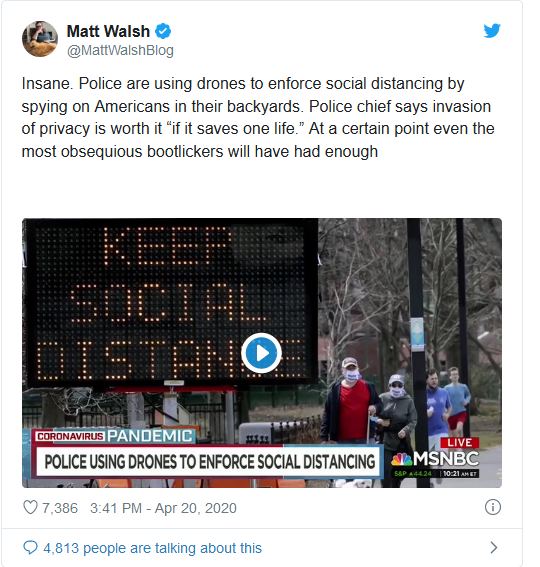Should the police be able to monitor what you’re doing in your backyard? City of Elizabeth officials think so. The police department is using drones to watch residents and broadcast warnings to those suspected of not following social distancing guidelines. The drones surveil areas that are not easy for officers to patrol with cars: parks, alleys, and yards behind houses.
This is a bold and rapid expansion of police power, and a disturbing step toward perpetual, warrantless surveillance. While Elizabeth law enforcement has previously used drones for specific, limited purposes, this appears to be their first foray into watching everyone, everywhere, all the time. And the practice is spreading. It’s also happening in Delaware, Connecticut, Florida, and California.
Many aspects of this surveillance program — apart from the obnoxious whining filling the skies — are unexplained and make it ripe for abuse. How does the drone know when two people walking next to each come from the same home? How can the police claim that no videos or photos are taken, yet at the same time threaten suspected violators with summons or fines? Will drone surveillance end when the pandemic is over? Privacy experts say that what the government takes, it does not give back. Previous expansions of surveillance suggest that what happens now will not end with the coronavirus.

Even more troubling is that these drones have been flagged by the Department of Homeland Security as a significant risk. Elizabeth’s drones consist of donated and on-loan equipment from Da Jiang Innovations (DJI), a company headquartered in Guangdong province in China. The drones may be sending data collected during flight to their manufacturers in China, where the information is accessible to the government.
U.S. government officials have warned that DJI specifically targets users within critical infrastructure and law enforcement sectors to collect sensitive data. Information about infrastructure isn’t the only data risk. China’s repressive social credit system is intimately connected with advanced facial recognition technology, which is built upon a database of more than 1 billion faces.
Elizabeth police claim the drones are not storing videos or photos, though they are clearly capable of doing so. DJI’s Mavic 2 Enterprise drone is built for industrial data collection. It has the ability to take high-quality video and zoomed-in photos with GPS timestamps, along with a thermal sensor and various attachable accessories. And as anyone who reads the news knows, organizations that claim not to use powerful data collection tools are often lying.
While previous Supreme Court cases have ruled that police may look into people’s yards from public air space using planes or helicopters, drones represent a substantially different technology that will likely result in new court cases. Planes and helicopters fly at high altitudes, and police cannot use them frequently due to their expense. It is not possible for a plane to closely follow an individual person walking down an alleyway, or to hover over someone’s backyard. Drones are small, cheap, agile and can fly at low altitudes. They could hover silently not only in public areas but also outside the windows of your home. Drones give police unprecedented capacity for perpetual public surveillance, treating everyone as a potential criminal without probable cause.
Because of these unique features, there is a strong possibility that routine use of drones by law enforcement may, in fact, violate the Fourth Amendment. This has yet to be tested in court. Perhaps a lawsuit in Elizabeth will be one of the first cases. Meanwhile, several states have banned law enforcement use of drones without a warrant, in a preemptive effort to respect the Constitution.
Chris Bollwage, the mayor of Elizabeth, says that if drone surveillance saves even one life, it’s all worth it. Is any rule that could speculatively save one life sufficiently justified? If so, driving should be banned. But as adults living in a free country, we accept that the benefits of free activity come with risks. Bollwage’s statement is not reasoning; it is rhetoric. It is rhetoric that implies anyone opposing drone surveillance want people to die. By presenting an untestable and unachievable rationalization for this unilateral power grab, it is essentially an argument that the ends justify the means — and the first step toward totalitarian thinking.
The stakes are higher than short-term public health. Authoritarian governments are on the rise worldwide, making the United States, while flawed, one of the remaining strongholds of freedom. Privacy is essential for freedom of thought and association. As Glenn Greenwald explains, “Mass surveillance creates a prison in the mind.” Guarding privacy is thus essential for preserving and revitalizing our democracy, and ultimately, our freedom as individuals.
It is therefore of great importance that we do not unquestioningly surrender what little remains of privacy to the police. Personal liberty is not a luxury to be enjoyed only when times are good. Even in troubled times —especially in troubled times — it is the core of the American spirit.
Source: nj.com




